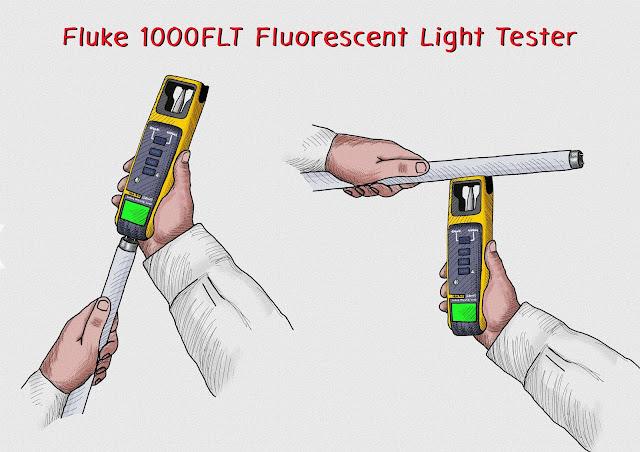Fluke 100flt
light tester makes the trial and testing for light sources easier. It provides
a five in one solution for testing and measurements.
Specifications:
Lamp Test:
3000 Vp-p Maximum Output
Ballast Test:
Frequency up to 20 kHz
Ballast Type
Range: 10ft distance
Pin
Continuity Test: Under 1kohms resistance
Non-Contact
Voltage Test: 85-400V AC and 45-67 Hz with 4 inches distance at max
Lamp Tests:
Power on the
device
Push the
lamp test button to start the test and keep pressing it during the test.
Place the
handle onto the fluorescent bulb without removing the bulb from the socket.
If blinking
starts, the lamp is good; else needs to be replaced.
Release the lamp
test button to end the test.
Ballast
test:
Power on the
device
Push the
ballast test button to start the test and keep pressing it during the test.
Place the
handle/rod onto both ends of the fluorescent bulb without removing the bulb
from the socket.
If the green LED starts blinking, the lamp is good; else needs to be replaced.
Release the
lamp test button to end the test.
Non-Contact
Voltage Test:
Turn on the
device
Push the
voltage alert button and rotate the device. See if the Red indicator light is
blinking.
Place the
device close to the voltage point.
A continuous
beep with red light indicates the presence of voltage.
Pin Test:
Power on the
device
Insert the pins
of the lamp into the device slots.
A green
blinking led indicates the lamp is functional, and a no-light shows the light
needs to be replaced.
Ballast Type
Test:
The built-in optical sensor can detect if the ballast type is magnetic or electronic-based.
Power on the
device.
Push the
ballast type button and keep it held during the test.
Keep the device within 10 feet of the lamp under testing and wait while the device runs it.
A green LED indicator shows the test is completed, and the test type can be read.






















.jpg)


No comments:
Post a Comment